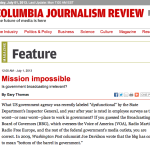“The true bureaucrat is a man of really remarkable talents. He writes a kind of English that is unknown elsewhere in the world, and an almost infinite capacity for forming complicated and unworkable rules.”
– H.L. Mencken
“For every complex problem, there is a solution that is simple, neat, and wrong.”
– H.L. Mencken
“Voice of America News, 1942-2015.”
By Gary Thomas
 As written, the 2015 BBG budget proposal is, for all intents and purposes, the death notice for substantive news coverage at the Voice of America. Should it be enacted, people around the world would only get the most simplistic of news reports, especially in English, the lingua franca of the host broadcaster – and not necessarily in a timely manner. Most disturbing of all, news would be blurred into national security policy goals.
As written, the 2015 BBG budget proposal is, for all intents and purposes, the death notice for substantive news coverage at the Voice of America. Should it be enacted, people around the world would only get the most simplistic of news reports, especially in English, the lingua franca of the host broadcaster – and not necessarily in a timely manner. Most disturbing of all, news would be blurred into national security policy goals.
The 112-page submission pays scant attention to journalism. There are few Uriah Heep-like paeans to news (“as we wrestle with trade-offs, excellence in journalism remains the BBG’s most important objective”). But such puffery obfuscates the true purpose of this abhorrent proposal. Wade through the thicket of deliberately dense bureaucratese, and that purpose is abundantly clear: to transform VOA – and other entities – into a foreign policy tool, placing VOA down a path away from news and towards propaganda.
Consider this passage from the submission:
“The BBG thus practices objective journalism – great journalism – but not as an end in itself. Rather, there is a purpose: to support U.S. national security interests. (italics added) This means freedom and democracy broadly, and more specifically, strategic goals to engage next-generation audiences, support a free and open press and provide exceptional content that helps in-country audiences understand U.S. policy, international events and the events particular to given countries and regions.”
This is the underlying, fundamental flaw of the entire proposal, and shows what happens when bureaucrats try to meddle in journalistic enterprises. What they continually fail to understand is that respectable and responsible journalism is an end in itself. Just being a truly independent, professional, and substantive journalistic entity burnishes VOA’s journalistic reputation and stands it as the finest testament to democracy in action. Burdening it with byzantine rules, stultifying bureaucracy, and government policy agendas greatly erodes its credibility, which is already severely damaged.
If this plan goes forward, the Central News Division, once the standard bearer for VOA’s journalistic ethos, will undergo “streamlining and restructuring.” The critical Jerusalem bureau will be closed. (Well, let’s see what the Israel lobby says to Congress about that.) The domestic bureau in Houston will be shuttered as well. The New Delhi bureau is already on the chopping block.
As the submission puts it: “Central News will accelerate its transition to multimedia production of original news content while reducing its output of blended news wires for language service translation. Central News will also act as a clearinghouse for original content produced by VOA language service journalists.” Nineteen positions will be eliminated.
TRANSLATION: “Language services, you’re on your own. The News Division will no longer produce long-form reports except when it is in national security interests to do so. Instead, the experienced journalists of Central News will be relegated to producing more insubstantial video fluff.”
(Interestingly, the budget does call for in-depth coverage of American elections and politics. Glad to see that, at least. National Correspondent Jim Malone is a true treasure in that arena. But is that REALLY America’s best export?)
English is, again, proposed for elimination. The budget proposal once more raises the tired argument that there is little market for “long-form English radio products” on shortwave and that these so-called “legacy programs” will be eliminated. The concept is to move ALL English program to Learning English programs – what has been known as “Special English.” Thus, virtually the only reports broadcast in America’s lingua franca will be very simplistic stories. It raises the question: where do people go to listen for in-depth news AFTER they have mastered English? BBC? Because there will be virtually nothing in English on VOA to listen to or to read online.
This drive is nothing new, of course. For several years now, VOA management, backed by the director and executive editor, has tried to (a) neuter the Central News Division, and (b) eliminate English. So far, it has failed. But they do not give up.
Breaking news coverage by Central News correspondents has been sacrificed on the altar of expediency. The English website is a joke – late on stories, and more often than not simply reproducing single-source wire service copy while experienced correspondents are redirected to produce time-consuming video for services that is often outdated by the time it is done. The services themselves – many of whom, by their own admission, are ill-staffed and/or trained for the task – must produce their own newscasts and stories. The concept of “43 newsrooms” is alive.
What much of this boils down to is, in my view, an issue of control. The News Division has always been feisty and outspoken to management, while the language service personnel have been more timid of the powers that be. Thus, so this logic goes, eliminate the one locus of dissent – the News Division – and diffuse power to the language services, and it will be much easier to impose tighter control across the house.
As for the language services:
“The BBG is also taking steps to address overlapping language services through enhanced collaboration among the BBG networks. This does not necessarily mean eliminating one or the other service. Rather, it means clarifying their respective roles and goals, differentiating their content, and sharing media platforms where appropriate.”
Cuts are envisioned for the Persian Service, Latin America Division, Indonesian, Georgian, Uzbek, and Azerbaijan. Albanian, Macedonian, Bosnian, and Serbian are to be eliminated. Meanwhile, broadcasts to Asia are to be beefed up at RFA and VOA. The budget says that this is “in line with the U.S. government’s strategic pivot towards Asia.”
(As an aside, I take one point of exception with my respected colleague “The Federalist.” In his latest post on BBGW, he says there is no language service overlap between VOA and the grantee services because they all have different missions. I respectfully disagree. While that may have been true early on and is true in theory, in practice those functional broadcasting lines have become increasingly blurred in today’s saturated media market and 24-hour-news cycle. VOA language services broadcast much of the same kind of material as the “surrogate” services of the grantees. Those lines of separation remain as bureaucratic artifice of budgetary justification. There is no question that there is duplication and that it should be addressed.)
The submission says the budget contains a “substantial reduction” to the IBB budget. Now, as the proposal shows, the IBB knows down to the exact number the proposed job reductions for every service. But when it comes to cutting positions in the IBB bureaucracy itself…well, that’s a different story:
“The IBB budget is composed primarily by salaries and as such will require substantial analysis in order to determine the most cost effective manner to achieve the required savings… the BBG has engaged the assistance of the Office of Personnel Management via its Human Resources Solutions division and expects to have completed its analysis within the third quarter of FY 2014. Upon completion of this analysis, the BBG will submit additional detail the IBB component that is compliant with its budgetary targets.”
Services and divisions’ budgets do not have salaries? The IBB bureaucracy is prepared to fight a rearguard action to save their own skins, but not anybody else’s.
What is most disturbing, however, is the move to push VOA and the entities away from journalism and into a more direct advocacy role. The term “propaganda” does not appear in the document. But the message is clear: the other fella does it, so we have to, too:
“The struggles unfolding today all have significant information or propaganda components. A war for influence is playing out on the stage of public opinion. Every non-democratic force now runs increasingly sophisticated information campaigns.”
Of course, the U.S. does not use that loaded term “propaganda.” It prefers the more benign-sounding “public diplomacy.” The USC Center on Public Diplomacy’s website notes that “in the past few decades, public diplomacy has been widely seen as the transparent means by which a sovereign country communicates with publics in other countries aimed at informing and influencing audiences overseas for the purpose of promoting the national interest and advancing its foreign policy goals [italics added].”
And what does the BBG budget proposal say? As noted above: journalism exists “to support national security interests.” At the town hall meeting unveiling the budget plan, BBG Director of Global Strategy Robert Bole said the Office of Management and Budget and the White House gave BBG (and other agencies as well) “perhaps the most direct guidance we have ever received around foreign policy objectives and how you formulate those in the 2015 budget.” And he said there was input from the State Department and other agencies on how the BBG is to “formulate strategic goals.”
In other words, public diplomacy will trump journalism.
(Interestingly, the submission says it is in support of the 2012-2016 Strategic Plan. This is, of course, the plan with the goal of becoming “the world’s leading international news agency by 2016.” It is also where we first see the “mission statement” to “inform, engage, and connect people around the world in support of freedom and democracy. “ But it also says it advances a new Strategic Plan for 2014-2018 – a plan that has not as of this writing been made public.)
So Learning English will be “partnered” with the State Department. And the Office of Cuba Broadcasting is seeking a direct $5 million infusion from the State Department’s Economic and Support Fund.
Asked at the town hall meeting by veteran correspondent Jim Malone about the erosion of the journalistic work, Robert Bole said the firewall will not be crossed, but added that BBG “is an administrative agency” and that BBG benefits monetarily from partnering with other agencies, noting that it received “surge money” from the State Department for Ukrainian broadcasts. He said keeping the policy and journalistic sides separate was part of a “delicate balance.” He said that if there were any concerns, “come see me, corner me in the hallway.”
BBG Chairman Jeff Shell says BBG’s commitment to the journalistic mission is “unwavering even in the fact of limited resources and a volatile international operating environment.” Noble words, indeed, but I fear that the FY 2015 budget proposal belies that commitment. Independent and substantive journalism, once the bedrock of U.S. international broadcasting, is being strangled at VOA as the BBG and IBB push, prod, poke, and drag it into an abyss of policy advocacy out of which it will never be able to climb to regain its journalistic credibility and status.
R.I.P.
Gary Thomas was a Voice of America (VOA) senior correspondent and news analyst specializing in national security and intelligence issues. He served in Islamabad and Bangkok and covered stories throughout South and Southeast Asia. He retired from VOA in 2012 after 27 years.
 Gary Thomas’ Columbia Journalism Review article, “Mission Impossible,” about management problems at Voice of America, International Broadcasting Bureau (IBB) and their parent agency, the Broadcasting Board of Governors (BBG), has been widely read and cited. Voice of America had refused to answer questions for the article and denounced its author after it was published.
Gary Thomas’ Columbia Journalism Review article, “Mission Impossible,” about management problems at Voice of America, International Broadcasting Bureau (IBB) and their parent agency, the Broadcasting Board of Governors (BBG), has been widely read and cited. Voice of America had refused to answer questions for the article and denounced its author after it was published.
A frequent critic of Voice of America management during his service on the BBG board, Ambassador Victor Ashe, apologized to Columbia Journalism Review and to Thomas for VOA’s refusal to answer legitimate questions from a journalist. Other members of the Independent Committee for U.S. International Broadcasting (CUSIB – cusib.org) also expressed their dismay that VOA executives would treat media inquiries the same way as undemocratic regimes treat journalists who ask difficult questions.

Comments are closed.